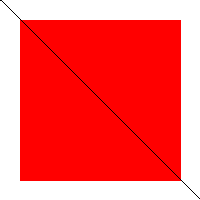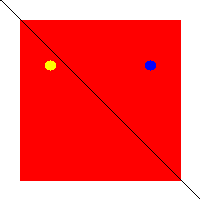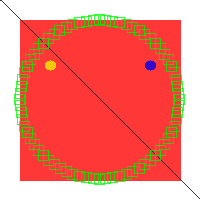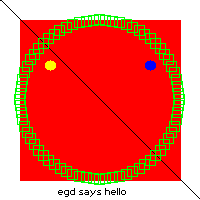2 egd
2.1 Introduction
The egd module is an interface for 2d-image rendering and is used by Percept to generate dynamic graphs to its web pages. All code is pure erlang, no drivers needed.
The library is intended for small to medium image sizes with low complexity for optimal performance. The library handles horizontal lines better then vertical lines.
The foremost purpose for this module is to enable users to generate images from erlang code and/or datasets and to send these images to either files or web servers.
2.2 File example
Drawing examples:
-module(img).
-export([do/0]).
do() ->
Im = egd:create(200,200),
Red = egd:color({255,0,0}),
Green = egd:color({0,255,0}),
Blue = egd:color({0,0,255}),
Black = egd:color({0,0,0}),
Yellow = egd:color({255,255,0}),
% Line and fillRectangle
egd:filledRectangle(Im, {20,20}, {180,180}, Red),
egd:line(Im, {0,0}, {200,200}, Black),
egd:save(egd:render(Im, png), "/home/egil/test1.png"),
egd:filledEllipse(Im, {45, 60}, {55, 70}, Yellow),
egd:filledEllipse(Im, {145, 60}, {155, 70}, Blue),
egd:save(egd:render(Im, png), "/home/egil/test2.png"),
R = 80,
X0 = 99,
Y0 = 99,
Pts = [ { X0 + trunc(R*math:cos(A*math:pi()*2/360)),
Y0 + trunc(R*math:sin(A*math:pi()*2/360))
} || A <- lists:seq(0,359,5)],
lists:map(
fun({X,Y}) ->
egd:rectangle(Im, {X-5, Y-5}, {X+5,Y+5}, Green)
end, Pts),
egd:save(egd:render(Im, png), "/home/egil/test3.png"),
% Text
Filename = filename:join([code:priv_dir(percept), "fonts", "6x11_latin1.wingsfont"]),
Font = egd_font:load(Filename),
{W,H} = egd_font:size(Font),
String = "egd says hello",
Length = length(String),
egd:text(Im, {round(100 - W*Length/2), 200 - H - 5}, Font, String, Black),
egd:save(egd:render(Im, png), "/home/egil/test4.png"),
egd:destroy(Im).
First save.

Figure 2.1: test1.png
Second save.

Figure 2.2: test2.png
Third save.

Figure 2.3: test3.png
Fourth save.

Figure 2.4: test4.png
2.3 ESI example
Using egd with inets ESI to generate images on the fly:
-module(img_esi).
-export([image/3]).
image(SessionID, _Env, _Input) ->
mod_esi:deliver(SessionID, header()),
Binary = my_image(),
mod_esi:deliver(SessionID, binary_to_list(Binary)).
my_image() ->
Im = egd:create(300,20),
Black = egd:color({0,0,0}),
Red = egd:color({255,0,0}),
egd:filledRectangle(Im, {30,14}, {270,19}, Red),
egd:rectangle(Im, {30,14}, {270,19}, Black),
Filename = filename:join([code:priv_dir(percept), "fonts", "6x11_latin1.wingsfont"]),
Font = egd_font:load(Filename),
egd:text(Im, {30, 0}, Font, "egd with esi callback", Black),
Bin = egd:render(Im, png),
egd:destroy(Im),
Bin.
header() ->
"Content-Type: image/png\r\n\r\n".

Figure 2.5: Example of result.
For more information regarding ESI, please see inets application mod_esi.
